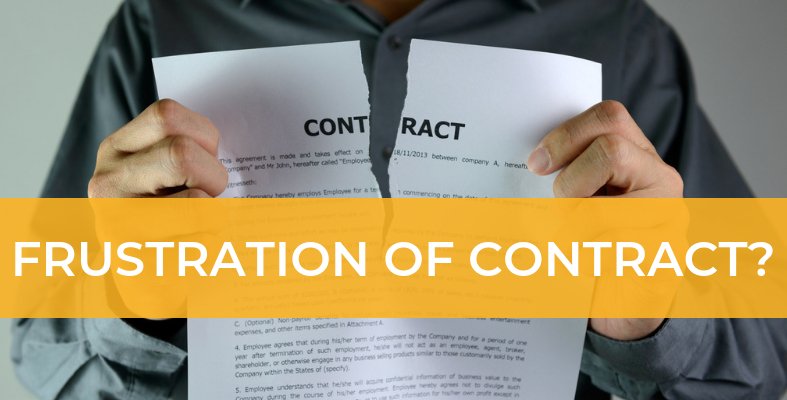Frustration of Contract: When Agreements Meet Unforeseen Obstacles

Contracts are the lifeblood of commercial and personal interactions, outlining the rights and obligations of parties involved. However, in some cases, unforeseen circumstances can render the performance of a contract impossible, impractical, or fundamentally different from what was initially agreed upon. This legal principle is known as “frustration of contract.” In this blog post, we will explore the concept of frustration of contract, its key elements, examples, and the legal implications that arise when a contract becomes frustrated.
Understanding Frustration of Contract
Frustration of contract is a legal doctrine that comes into play when an unforeseen event or circumstance occurs after the formation of a contract, making it impossible or radically different from what the parties originally intended. This doctrine recognizes that the parties should not be held to their contractual obligations if doing so would be unfair, unjust, or impossible due to circumstances beyond their control.
Key Elements of Frustration of Contract
To successfully claim frustration of contract, certain key elements must be established:
Existence of a Valid Contract: There must be a valid and enforceable contract in place before frustration can be considered. This includes the essential elements of a contract, such as offer, acceptance, consideration, and legal capacity.
Unforeseen Event or Circumstance: The event or circumstance leading to frustration must be unforeseen and beyond the control of the parties at the time of contract formation. It should not have been contemplated by the parties when they entered into the agreement.
Fundamental Change: The event or circumstance must fundamentally change the nature of the contract, rendering performance impossible, illegal, or radically different from what was initially intended.
No Fault of the Parties: The frustration must not be due to the fault or negligence of either party. If one of the parties caused or contributed to the frustrating event, they may still be held responsible for contractual obligations.
Examples of Frustration of Contract
Destruction of Subject Matter: If a contract involves the sale of a specific item or property, and that item is destroyed without the fault of either party before the contract is executed, the contract may be frustrated. For instance, if a painting commissioned by a buyer is destroyed in a fire, the contract may be frustrated.
Illegality: If a change in the law renders the performance of a contract illegal, it can lead to frustration. For example, a contract to export a product that becomes subject to export restrictions due to new regulations may be frustrated.
Illness or Death: In personal service contracts, such as contracts with entertainers, artists, or key personnel, if the individual becomes seriously ill or passes away, rendering their performance impossible or substantially different, the contract may be frustrated.
War or Natural Disasters: Events such as wars, natural disasters, or government actions can make it impossible to perform certain contracts. For instance, a contract for the delivery of goods may be frustrated if a hurricane destroys the shipping port.
Legal Implications of Frustration of Contract
When a contract is frustrated, it does not necessarily mean that the parties are completely released from all obligations. Instead, the legal consequences of frustration can vary:
Termination of Contract: Frustration typically leads to the termination of the contract, relieving both parties from their future obligations. Any obligations that have already been performed or benefits received before frustration occurred remain valid.
Restitution: If one party has received a benefit under the contract before frustration, the other party may be entitled to restitution. This means that they should be compensated for the value of the benefit received.
Limitation on Future Claims: Frustration can limit the ability of either party to make future claims against the other for damages resulting from the frustration event.
No Compensation for Anticipated Gains: Unlike breach of contract cases, where damages may be sought, parties generally cannot claim compensation for anticipated profits in cases of frustration.
Conclusion
Frustration of contract is a legal principle that recognizes the need for flexibility in contractual relationships when unforeseen and uncontrollable events disrupt the ability to perform a contract as initially intended. It is a doctrine that seeks to strike a balance between upholding the sanctity of contracts and acknowledging the limits imposed by unpredictable circumstances. Parties entering into contracts should be aware of the possibility of frustration and include appropriate provisions in their agreements to address such situations. Ultimately, the law surrounding frustration of contract serves to promote fairness and justice in contractual relationships, ensuring that parties are not unduly burdened by events beyond their control.


